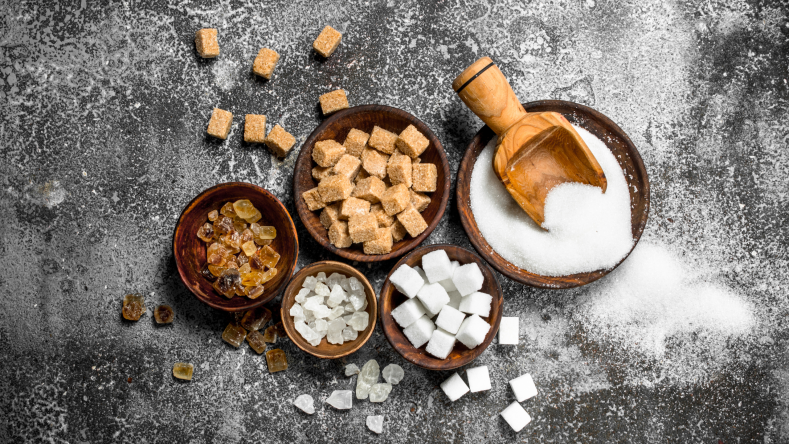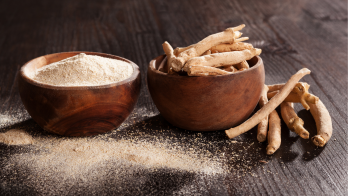Busting nutrition myths about weight loss
Weight loss is a complicated topic that has a halo of misinformation surrounding it. But what does science have to say? Here’s what you need to know about weight loss and the nutrition myths surrounding it.

Contents
Myth: Exercise is the only way to lose weight. Myth: Eating fat will make you gain weight. Myth: Supplements can help you lose weight. Myth: You need to eat breakfast to lose weight. Myth: Sleep doesn’t affect weight. Myth: Eating sugar will derail your diet. Myth: Gut health is unrelated to weight. How can Elo help? Summary Key takeawaysIf you’re trying to get rid of some pesky pounds, you're not alone. According to the CDC, roughly half of the US adult population attempts to slim down each year [ 41
Weight loss is a complicated topic that goes far beyond how many calories you eat– genetics sleep stress levels physical activity
Unfortunately, this incredibly difficult topic has a halo of misinformation surrounding it. Just open social media and you’re sure to find the latest weight loss hacks. Whether it’s magic pills, excessive restriction, or wacky diets, the trendy suggestions never seem to end. So, how can you distinguish the good from the bad to determine what weight loss methods are right for you?
To set the record straight, we’re diving into the science to bust nutrition myths about weight loss. From dietary fats to gut health and intermittent fasting, here’s everything you need to know about losing weight.
Before embarking on a weight loss regime, you should speak with a healthcare provider to see if this is right for you.

Myth: Exercise is the only way to lose weight.
Reality: You can’t out-exercise a poor diet.
You can lose weight through consistent exercise, so getting up and moving is a great start. Research suggests that 150-250 minutes of moderate-intensity physical activity (like walking, recreational sports, gardening, or weight training) each week will provide modest weight loss, while greater amounts (>250 minutes/week) have been associated with clinically significant weight loss [ 1
However, you can’t consistently eat a poor diet and expect the gym to work its magic. A diet rich in processed foods, refined sugar, and saturated fats can contribute to excess calories and negative health outcomes, so while exercise may create an initial caloric deficit, this can be quickly offset with poor dietary patterns.
Let’s use running as an example. It’s estimated that a 120-pound person burns 11 calories/minute while running, so running a 10-minute mile would equate to about 110 calories burned. Alternatively, someone who weighs 180 pounds would burn approximately 17 calories/minute, equaling 170 calories for a 10-minute mile [ 2
Since both diet and exercise play important roles in weight loss, it’s recommended to fill up on whole foods (like produce, lean protein, whole grains, and healthy fats), limit alcohol, added sugars, and trans-fats, and stay physically active.

Myth: Eating fat will make you gain weight.
Reality: Not all fats are detrimental to weight loss.
Dietary fat is essential for many bodily functions, as it provides energy, supports cell growth, and helps the body absorb the fat-soluble vitamins A, D, E and K [ 3 4 3 4
Studies also suggest that poly- and monounsaturated fats may improve insulin metabolism and lower insulin sensitivity (both of which can assist with weight loss), whereas omega-3s can improve fat metabolism and decrease hunger levels [ 5 6 7 8
However, you can have too much of a good thing. Fats are calorically dense (9 kcal/g compared to 4 kcal/g with carbs and protein), so if you over-consume, you may further contribute to excess calories which can lead to weight gain [ 10 9
Myth: Supplements can help you lose weight.
Reality: There is no magic pill for weight loss.
Supplements are a notoriously murky, unregulated market where companies don’t have to demonstrate their products are safe before being sold to the public. Unfortunately, what you see on the label isn’t always the product you get.
Even though it’s illegal for manufacturers to claim that supplements treat, diagnose, prevent or cure diseases, they can mislead consumers with marketing tactics and clever wording. These unsubstantiated claims often overpromise and under-deliver, and since there is little research to back them up, these recommendations are generally ineffective, dangerous, or both.
While this rings true for any supplement that isn’t third-party tested
Additionally, weight loss supplements and diet pills can be accompanied by nasty side effects (like increased blood pressure, insomnia, elevated heart rate, diarrhea, nausea, vomiting, heartburn, and dizziness), and can increase your risk of heart attack, stroke, and even death [ 11
Moral of the story: quick fixes are never the answer for anything, so if you see a supplement (or pill for that matter) that claims to shed fat, run far, far away.

Myth: You need to eat breakfast to lose weight.
Reality: Intermittent fasting may prove beneficial for weight loss.
Different eating schedules work for different people. Some people do and feel better when not eating upon waking, while others need that morning meal for energy and satiety.
People who feel better without eating in the morning may want to consider Intermittent fasting
Science says yes, especially in regards to weight loss. Studies have shown that those who tried intermittent fasting lost 0.55 - 1.65 lbs/week, or a 3-8% reduction in body weight over a period of 3–24 weeks [ 12 13
Since the key characteristic of IF is cycling between periods of fasting and eating for specific times throughout the day or week, many people find this easier to stick to for the long run. And, since time between meals is the only real restriction with IF, the beauty is that you can eat when you want as long as it fits in your eating window. So, if you aren’t a breakfast eater, you can create your eating schedule around what times feel best for you.
Although intermittent fasting can provide health benefits for many people, this method may not be for everyone. Fasting for long periods of time can cause headaches, lightheadedness, mood changes, constipation, fatigue, blood sugar imbalances, and irritability if not approached correctly.
Additionally, IF can lead to inadequate nutrition intake (and subsequent deficiencies), reproductive problems, and reduced sports performance. This eating approach can be hard to manage in social situations, and it may mask disordered eating.
Myth: Sleep doesn’t affect weight.
Reality: How much shut-eye you get can impact the number on the scale.
Health and nutrition experts all agree that adults between 18 and 60 years old should get at least seven hours of sleep each night; however, despite these recommendations, it’s estimated that one-third of Americans consistently fall short [ 14 15 16
While sleep deprivation can spell disaster for chronic diseases (like diabetes, cardiovascular disease, and depression), studies have shown that not getting enough shuteye will make weight loss more difficult and possibly even promote weight gain [ 17
Here are some ways that a lack of sleep might impact the number on the scale.
Enhanced cravings. Sleep deprivation can alter food preferences and your body’s hunger-satiety signaling system. As such, studies suggest that reduced sleep can impair your ability to fight cravings for highly processed and palatable foods due to an increase in activation of the endocannabinoid system (a key part of pathways involved in appetite and food intake), and ghrelin levels (the body’s hunger hormone) [
18
,19
]. This can translate to increased food intake, particularly of hard-to-resist sweets and high-calorie snacks.Sedentary lifestyle and chronic disease risk. Being sleep-deprived can hinder your body’s ability to restore energy levels and make it more difficult to stay active, which might impede weight loss and even promote further weight gain. Moreover, evidence shows that a sedentary lifestyle is linked to numerous potential health risks, including increased all-cause mortality, obesity, cardiovascular disease, cancer, diabetes, hypertension, and depression [
20
].Metabolic changes. Research shows that a lack of sleep can cause disruptions in glucose utilization and storage, insulin sensitivity, and/or lipid metabolism [
21
]. Since these changes in metabolic function are tied to an overstimulation of the sympathetic nervous system, hormonal imbalances, inflammation and weight gain are more likely to occur as a result of sleep deprivation [22
].
If you’re looking to get a better night’s sleep and possibly stave off weight gain, here are some science-backed suggestions to boost sleep hygiene:
Stick to a schedule.
Create a peaceful environment.
Put devices away.
Avoid stimulants.
Stay physically active.
Try some
natural supplements
.

Myth: Eating sugar will derail your diet.
Reality: Not all sugar is evil.
Contrary to popular belief, not all sugar leads the charge for weight gain and negative health outcomes.
While there are different types of sugar (such as dextrose, fructose, galactose, glucose, lactose, maltose, and sucrose), not all of them are bad for your health. Here’s what science has to say about the differences between natural and refined sugars.
Natural sugars.
As the name suggests, natural sugars are found naturally in fruits, vegetables, grains, and dairy products. They can prove beneficial to health, as these foods contain other essential nutrients like vitamins, minerals, fiber, and antioxidants that are needed for energy metabolism, immune function, cell health, and more.
A diet rich in fruits and vegetables can also help reduce the risk of chronic diseases, such as diabetes, heart disease, obesity, and some cancers [ 23 recommended to eat 2 servings of fruit/day and 3 servings of vegetables/day.
Refined sugars.
This type of sugar is processed from sugar cane or sugar beets and is typically found as sucrose (a combination of glucose and fructose). Unlike naturally occurring, unrefined sugars in whole foods that are typically paired with fiber, your body rapidly breaks down refined sugars causing insulin and blood sugar levels to spike. Diets high in refined (or added) sugars, specifically high fructose corn syrup, have been linked to insulin and leptin resistance, appetite dysregulation, and increased caloric intake, all of which may contribute to weight gain and obesity [ 24 25 26
Since refined sugars contribute a large number of calories but have little nutritional value otherwise, the American Heart Association recommends limiting added sugars to no more than 6% of calories/day, which amounts to no more than 6 teaspoons per day for women and no more than 9 teaspoons per day for men [ 27 28
Some examples of foods high in added sugars include:
Baked goods
Sugar-sweetened beverages
Processed foods
Sweetened dairy products like ice cream and yogurt
Candy
Sauces, salad dressings and certain canned goods (like canned fruit not in its own juices)
Myth: Gut health is unrelated to weight.
Reality: Studies show that obesity and the gut microbiome are closely related.
Gut health
Unfortunately, stress levels, lack of sleep, and certain foods can negatively impact the gut microbiome, and lead to adverse health outcomes that may also affect the number on the scale.
Since the microbiome is involved in lipid and carbohydrate metabolism, energy homeostasis, and fat storage in the liver, studies have found that the gut microbiota in obese people is less diverse than that of lean people, which can reduce metabolic energy consumption and lead to sub-optimal glycemic control [ 29 30 31 32 33 34
Research also suggests that the gut microbiota impacts leptin and ghrelin, two hormones that regulate hunger [ 35
Interestingly, emerging evidence suggests that increasing the gut microbiota diversity through probiotic and prebiotic supplementation may dampen cravings and facilitate weight loss [ 36 37
If you’re looking to boost your gut health, try adding these foods to your diet:
High fiber foods (such as beans, berries, avocados, artichokes, oats, chia seeds, popcorn, and legumes) can promote the growth of Bifidobacteria, a probiotic that has been shown to improve digestive health, break down food, absorb nutrients, and fight off disease-causing organisms [
38
].Fermented foods (like yogurt, kimchi, sauerkraut, miso, kombucha, and kefir) contain healthy bacteria that can help reduce the amount of disease-causing species in the gut [
39
].Apples, oats, garlic, asparagus, and bananas are just a few prebiotic foods that can encourage healthy bacteria growth and improve the microbiome diversity [
40
].
How can Elo help?
At Elo, our health coaches help you with your weight loss goals by using a well-rounded approach that focuses on diet and lifestyle behaviors.
For instance, they may suggest eliminating inflammatory foods, prioritizing protein, incorporating daily movement, and improving sleep habits, as these are all positive and sustainable habits that have enormous health benefits which go beyond the scale.
Additionally, our health coaches encourage you to aim for progress, not perfection, which is why tracking non-scale goals (like better mood, energy, and sleep) can prove beneficial.
If you’re interested in having one of our health coaches help with your weight loss goals,
give Elo a try today
.
Summary
With so many people looking to lose weight, it’s easy to see why there are many misconceptions surrounding this topic. However, weight loss is a complicated topic that goes far beyond how many calories you eat–factors such as physical activity, gut health, sleep, and diet all contribute to the number on the scale. As such, it’s recommended to talk with your healthcare provider before embarking on a weight loss regime.
Disclaimer: The text, images, videos, and other media on this page are provided for informational purposes only and are not intended to treat, diagnose, or replace personalized medical care.
Key takeaways
Weight loss is a complicated topic that goes far beyond how many calories you eat.
Research suggests that 150-250 minutes of moderate- intensity physical activity each week will provide modest weight loss, while greater amounts (>250 minutes/week) have been associated with clinically significant weight loss [
1
].Research suggests that poly- and monounsaturated fats may improve insulin metabolism and lower insulin sensitivity, whereas omega-3s can improve fat metabolism and decrease hunger levels [
5
,6
,7
,8
].Studies have shown that those who tried intermittent fasting lost 0.55 - 1.65 lbs/week, or a 3-8% reduction in body weight over a period of 3–24 weeks [
12
].A diet rich in fruits and vegetables can help reduce the risk of chronic diseases, such as diabetes, heart disease, obesity, and some cancers [
23
].Dysbiosis can lead to insulin resistance, impaired glucose tolerance, and excess fat accumulation, all of which may contribute to obesity and type 2 diabetes [
31
,32
,33
,34
].
References
Donnelly, Joseph E., Blair, Steven N., Jakicic, John M., Manore, Melinda M., Rankin, Janet W., & Smith, Bryan K. (2009). Appropriate physical activity intervention strategies for weight loss and prevention of weight regain for adults. Medicine & Science in Sports & Exercise, 41(2), 459–471.
https://doi.org/10.1249/mss.0b013e3181949333
Calorie burners: Activities that turn up the heat. (n.d.). Retrieved July 21, 2022, from
https://acewebcontent.azureedge.net/assets/education-resources/lifestyle/fitfacts/pdfs/fitfacts/itemid_2666.pdf
Maljaars, J., Romeyn, E. A., Haddeman, E., Peters, H. P. F., & Masclee, A. A. M. (2009). Effect of fat saturation on Satiety, hormone release, and Food Intake. The American Journal of Clinical Nutrition, 89(4), 1019–1024.
https://doi.org/10.3945/ajcn.2008.27335
Polyunsaturated fat. www.heart.org. (2022, July 20). Retrieved July 21, 2022, from
https://www.heart.org/en/healthy-living/healthy-eating/eat-smart/fats/polyunsaturated-fats
Kim, Y., Keogh, J. B., & Clifton, P. M. (2017). Benefits of Nut Consumption on Insulin Resistance and Cardiovascular Risk Factors: Multiple Potential Mechanisms of Actions. Nutrients, 9(11), 1271.
https://doi.org/10.3390/nu9111271
Riccardi, G., Giacco, R., & Rivellese, A. A. (2004). Dietary fat, insulin sensitivity and the metabolic syndrome. Clinical nutrition (Edinburgh, Scotland), 23(4), 447–456.
https://doi.org/10.1016/j.clnu.2004.02.006
Calder, P. C. (2010). Omega-3 fatty acids and inflammatory processes. Nutrients, 2(3), 355–374.
https://doi.org/10.3390/nu2030355
Lee, S., Gura, K. M., Kim, S., Arsenault, D. A., Bistrian, B. R., & Puder, M. (2006). Current clinical applications of omega-6 and omega-3 fatty acids. Nutrition in clinical practice : official publication of the American Society for Parenteral and Enteral Nutrition, 21(4), 323–341.
https://doi.org/10.1177/0115426506021004323
Hooper, L., Martin, N., Jimoh, O. F., Kirk, C., Foster, E., & Abdelhamid, A. S. (2020). Reduction in saturated fat intake for cardiovascular disease. The Cochrane database of systematic reviews, 5(5), CD011737.
https://doi.org/10.1002/14651858.CD011737.pub2
Wake Forest University Baptist Medical Center. (2006, June 19). Trans Fat Leads To Weight Gain Even On Same Total Calories, Animal Study Shows. ScienceDaily. Retrieved July 21, 2022 from
www.sciencedaily.com/releases/2006/06/060619133024.htm
Side effects of weight loss drugs (diet pills). Drugs.com. (n.d.). Retrieved July 21, 2022, from
https://www.drugs.com/article/side-effects-weight-loss-drugs.html#
Barnosky, A. R., Hoddy, K. K., Unterman, T. G., & Varady, K. A. (2014). Intermittent fasting vs daily calorie restriction for type 2 diabetes prevention: A review of human findings. Translational Research, 164(4), 302–311.
https://doi.org/10.1016/j.trsl.2014.05.013
Gabel, K., Hoddy, K. K., Haggerty, N., Song, J., Kroeger, C. M., Trepanowski, J. F., Panda, S., & Varady, K. A. (2018). Effects of 8-hour time restricted feeding on body weight and metabolic disease risk factors in obese adults: A pilot study. Nutrition and Healthy Aging, 4(4), 345–353.
https://doi.org/10.3233/nha-170036
Watson, N. F., Badr, M. S., Belenky, G., Bliwise, D. L., Buxton, O. M., Buysse, D., Dinges, D. F., Gangwisch, J., Grandner, M. A., Kushida, C., Malhotra, R. K., Martin, J. L., Patel, S. R., Quan, S. F., & Tasali, E. (2015). Recommended Amount of Sleep for a Healthy Adult: A Joint Consensus Statement of the American Academy of Sleep Medicine and Sleep Research Society. Sleep, 38(6), 843–844.
https://doi.org/10.5665/sleep.4716
Barnes, C. M., & Drake, C. L. (2015). Prioritizing sleep health. Perspectives on Psychological Science, 10(6), 733–737.
https://doi.org/10.1177/1745691615598509
Why is sleep important to weight loss? Sleep Foundation. (2022, April 15). Retrieved July 21, 2022, from
https://www.sleepfoundation.org/physical-health/weight-loss-and-sleep
Centers for Disease Control and Prevention. (2018, August 8). CDC - sleep and chronic disease - sleep and sleep disorders. Centers for Disease Control and Prevention. Retrieved July 21, 2022, from
https://www.cdc.gov/sleep/about_sleep/chronic_disease.html
Broussard, J. L., Kilkus, J. M., Delebecque, F., Abraham, V., Day, A., Whitmore, H. R., & Tasali, E. (2015). Elevated ghrelin predicts food intake during experimental sleep restriction. Obesity, 24(1), 132–138.
https://doi.org/10.1002/oby.21321
Hanlon, E. C., Tasali, E., Leproult, R., Stuhr, K. L., Doncheck, E., de Wit, H., Hillard, C. J., & Van Cauter, E. (2016). Sleep restriction enhances the daily rhythm of circulating levels of endocannabinoid 2-arachidonoylglycerol. Sleep, 39(3), 653–664.
https://doi.org/10.5665/sleep.5546
Park, J. H., Moon, J. H., Kim, H. J., Kong, M. H., & Oh, Y. H. (2020). Sedentary lifestyle: Overview of updated evidence of potential health risks. Korean Journal of Family Medicine, 41(6), 365–373.
https://doi.org/10.4082/kjfm.20.0165
Depner, C. M., Stothard, E. R., & Wright, K. P. (2014). Metabolic consequences of sleep and circadian disorders. Current Diabetes Reports, 14(7).
https://doi.org/10.1007/s11892-014-0507-z
Sharma, S., & Kavuru, M. (2010). Sleep and metabolism: an overview. International journal of endocrinology, 2010, 270832.
https://doi.org/10.1155/2010/270832
Boeing, H., Bechthold, A., Bub, A., Ellinger, S., Haller, D., Kroke, A., Leschik-Bonnet, E., Müller, M. J., Oberritter, H., Schulze, M., Stehle, P., & Watzl, B. (2012). Critical review: vegetables and fruit in the prevention of chronic diseases. European journal of nutrition, 51(6), 637–663.
https://doi.org/10.1007/s00394-012-0380-y
Baena, M., Sangüesa, G., Dávalos, A., Latasa, M. J., Sala-Vila, A., Sánchez, R. M., Roglans, N., Laguna, J. C., & Alegret, M. (2016). Fructose, but not glucose, impairs insulin signaling in the three major insulin-sensitive tissues. Scientific reports, 6, 26149.
https://doi.org/10.1038/srep26149
Shapiro, A., Mu, W., Roncal, C., Cheng, K. Y., Johnson, R. J., & Scarpace, P. J. (2008). Fructose-induced leptin resistance exacerbates weight gain in response to subsequent high-fat feeding. American journal of physiology. Regulatory, integrative and comparative physiology, 295(5), R1370–R1375.
https://doi.org/10.1152/ajpregu.00195.2008
Beckman Institute for Advanced Science and Technology. (2015, June 1). Fructose contributes to weight gain, physical inactivity, and body fat, researchers find. ScienceDaily. Retrieved July 21, 2022 from
www.sciencedaily.com/releases/2015/06/150601122540.htm
The sweet danger of added sugars . (n.d.). Retrieved July 21, 2022, from
https://www.ejpd.eu/pdf/EJPD_2019_20_2_1.pdf
Added sugars. www.heart.org. (2021, November 2). Retrieved July 21, 2022, from
https://www.heart.org/en/healthy-living/healthy-eating/eat-smart/sugar/added-sugars
Muscogiuri, G., Cantone, E., Cassarano, S., Tuccinardi, D., Barrea, L., Savastano, S., & Colao, A. (2019). Gut microbiota: A new path to treat obesity. International Journal of Obesity Supplements, 9(1), 10–19.
https://doi.org/10.1038/s41367-019-0011-7
Bae, J. P., Lage, M. J., Mo, D., Nelson, D. R., & Hoogwerf, B. J. (2016). Obesity and glycemic control in patients with diabetes mellitus: Analysis of physician electronic health records in the US from 2009-2011. Journal of diabetes and its complications, 30(2), 212–220.
https://doi.org/10.1016/j.jdiacomp.2015.11.016
Li, W. Z., Stirling, K., Yang, J. J., & Zhang, L. (2020). Gut microbiota and diabetes: From correlation to causality and mechanism. World journal of diabetes, 11(7), 293–308.
https://doi.org/10.4239/wjd.v11.i7.293
Rodrigues, R. R., Gurung, M., Li, Z., García-Jaramillo, M., Greer, R., Gaulke, C., Bauchinger, F., You, H., Pederson, J. W., Vasquez-Perez, S., White, K. D., Frink, B., Philmus, B., Jump, D. B., Trinchieri, G., Berry, D., Sharpton, T. J., Dzutsev, A., Morgun, A., & Shulzhenko, N. (2021). Transkingdom interactions between lactobacilli and hepatic mitochondria attenuate western diet-induced diabetes. Nature Communications, 12(1).
https://doi.org/10.1038/s41467-020-20313-x
Gérard, C., & Vidal, H. (2019). Impact of Gut Microbiota on Host Glycemic Control. Frontiers in endocrinology, 10, 29.
https://doi.org/10.3389/fendo.2019.00029
Basak, S., Banerjee, A., Pathak, S., & Duttaroy, A. K. (2022). Dietary fats and the gut microbiota: Their impacts on lipid-induced metabolic syndrome. Journal of Functional Foods, 91, 105026.
https://doi.org/10.1016/j.jff.2022.105026
Han, H., Yi, B., Zhong, R., Wang, M., Zhang, S., Ma, J., Yin, Y., Yin, J., Chen, L., & Zhang, H. (2021). From gut microbiota to host appetite: Gut microbiota-derived metabolites as key regulators. Microbiome, 9(1).
https://doi.org/10.1186/s40168-021-01093-y
Fetissov S. O. (2017). Role of the gut microbiota in host appetite control: bacterial growth to animal feeding behaviour. Nature reviews. Endocrinology, 13(1), 11–25.
https://doi.org/10.1038/nrendo.2016.150
Cani, P. D., Lecourt, E., Dewulf, E. M., Sohet, F. M., Pachikian, B. D., Naslain, D., De Backer, F., Neyrinck, A. M., & Delzenne, N. M. (2009). Gut microbiota fermentation of prebiotics increases satietogenic and incretin gut peptide production with consequences for appetite sensation and glucose response after a meal. The American journal of clinical nutrition, 90(5), 1236–1243.
https://doi.org/10.3945/ajcn.2009.28095
Klinder, A., Shen, Q., Heppel, S., Lovegrove, J. A., Rowland, I., & Tuohy, K. M. (2016). Impact of increasing fruit and vegetables and flavonoid intake on the human gut microbiota. Food & Function, 7(4), 1788–1796.
https://doi.org/10.1039/c5fo01096a
Alvaro, E., Andrieux, C., Rochet, V., Rigottier-Gois, L., Lepercq, P., Sutren, M., Galan, P., Duval, Y., Juste, C., & Doré, J. (2007). Composition and metabolism of the intestinal microbiota in consumers and non-consumers of yogurt. The British journal of nutrition, 97(1), 126–133.
https://doi.org/10.1017/S0007114507243065
Markowiak, P., & Śliżewska, K. (2017). Effects of Probiotics, Prebiotics, and Synbiotics on Human Health. Nutrients, 9(9), 1021.
https://doi.org/10.3390/nu9091021
Attempts to lose weight among adults in the United States, 2013–2016. (n.d.). Retrieved July 22, 2022, from
https://www.cdc.gov/nchs/data/databriefs/db313.pdf







